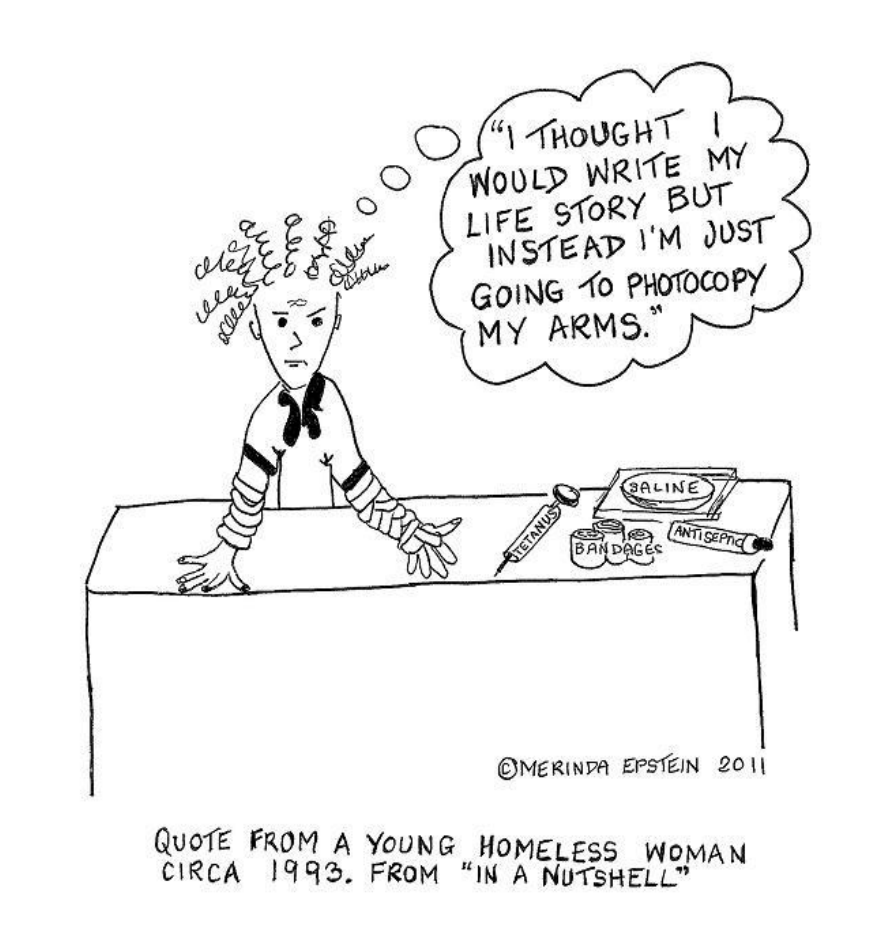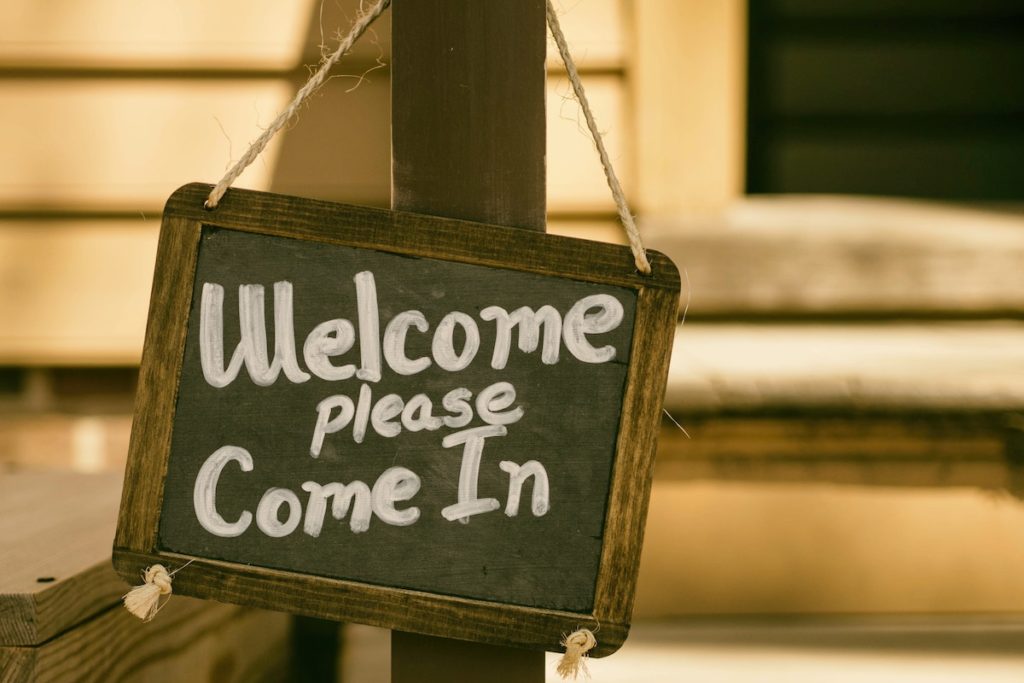
The power of the human story is ubiquitous. It grabs headlines, it personalises policy, it brings personal meaning and a human face to many different audiences. There are, however, enormous challenges facing those of us deemed mad or mentally ill to finding our own voices and telling our stories without fear or judgment. We are surrounded by societal disbelief in our credibility and silenced by services that seek to reinterpret and reframe our experiences to fit diagnostic categories and ever-decreasing services.
And then there is Recovery. Recovery originally offered a different potential narrative, opening up the space for people to tell their own stories and for the possibility of hope and meaning. However, a lot has happened since the first voices of Recovery were raised, particularly in the Global North.
This paper seeks to identify the Recovery Narrative as a narrative genre, arguing that it limits what is an acceptable narrative of recovery to those that comply with the ‘positivity imperative’ and, by doing so, it silences many potential stories and storytellers (Woods, Hart and Spandler, 2019). The authors (Angela Woods, Akiko Hart and Helen Spandler) aim to open up the space for critical debate of the Recovery Narrative as a means of communicating people’s experiences of madness, distress and mental illness in a particular way – promoting the “compulsory positivity” of Recovery. They seek to reframe the debate about what constitutes a “good, effective or politically acceptable” narrative of recovery and encourage the proliferation of alternatives. In doing so, they attempt to tread a careful line between critiquing the Recovery Narrative (as a genre or particular kind of imposed storytelling) and people’s individual stories, an important point that I will return to later.

There are enormous challenges facing those of us deemed mad or mentally ill to finding our own voices and telling our stories without fear or judgment.
Recovery
The authors write from a critical medical humanities background and draw upon literary and sociological approaches alongside experiential knowledge from their involvement in activism, publishing, campaigning and policy in the UK and internationally. They begin by outlining the way in which Recovery has become incorporated throughout mental health services in the Global North, despite having roots in the consumer/survivor/ex-patient movements of the 1970s and 1980s. Considerable research effort has been directed into defining, measuring and operationalising Recovery over the last few decades, removing it from its ‘deeply personal’ starting point, to quote one of the most quoted advocates of Recovery, William Anthony (1993).
The authors argue that Recovery has been co-opted by neoliberal policies seeking to reduce welfare spending and long term dependence on services and promote individual responsibility and ‘back to work’ agendas. These powerful forces compromise both the definitions and the operationalisation of Recovery, which started out with a strong message of hope in its service user roots (Deegan, 1988) but with the understanding that people could forge and define their own versions of recovery. This is no longer so straightforward.

The authors argue that Recovery has been co-opted by neoliberal policies seeking to reduce welfare spending and long term dependence on services and promote individual responsibility and ‘back to work’ agendas.
Recovery Narratives
The authors outline the place of personal narratives within Recovery policy. The personal narrative was always a central part of the recovery approach in its original manifestation; that individuals should be given the space to tell their own story as a stepping stone towards recovery. This has been subtly (or perhaps, not so subtly) transformed into people telling their stories of recovery; powerful stories of individual recovery, from distress through acceptance and the overcoming of adversity to a present, with the intention of inspiring hope in others.
Many charities, organisations and researchers have collected stories of recovery to demonstrate that ‘recovery works’. Guides and training programmes have been developed to help people to tell their Recovery story in the best possible way, for example encouraging short narratives with an obvious beginning, middle and end using clear and accessible language and a message of learning (SAMHSA 2017). More significantly perhaps, where such stories are intended for public consumption (whether in written or verbal forms) the story and the storyteller need to demonstrate that they have insight into their problems, their distress or mental illness, and are able to share this insight with others in a rational and credible way. There is no place here for people who retain beliefs that might be labelled psychotic or who tell their story in a way that confuses the audience or counters the positivity imperative.
And so, the authors argue, the central role given to individual narratives of recovery (narratives as a technology of Recovery) has enabled the success of Recovery policies, as enacted through Recovery Colleges and other Recovery and peer support training programmes, policy guidelines and so on. The Recovery narrative has become the Recovery Narrative genre: a type of story and storytelling that fulfils a particular format and objective. It tells a kind of success story or positive journey from distress and disadvantage through to recovery, with insight and clarity. It conveys a message and it is required to convey a message.
Sharing your story makes recovery real. It’s not a story of recovery until you tell someone else. Until that happens, it is just a hope inside of you
(Boll, 2015, quoted in Woods et al, p.11)

Recovery Narratives: There is no place here for people who retain beliefs that might be labelled psychotic or who tell their story in a way that confuses the audience or counters the positivity imperative.
Underlying assumptions
The authors explore four tenets or assumptions they believe underlie the Recovery Narrative, which they feel need to be made explicit. These are:
- “The Recovery Narrative speaks to all human experience”
- “The benefits of Recovery Narrative for the storyteller greatly outweigh any harm”
- “The Recovery Narrative always has wider social benefits beyond the individual storyteller”
- “The Recovery Narrative should not be the focus of critique”
“The Recovery Narrative speaks to all human experience”
The first of these is perhaps the most significant, in that it speaks to the silencing of stories and storytellers that do not fit within the positivity imperative of the Recovery Narrative genre. There is an assumption that human beings are all naturally driven to narrative self-articulation, which the authors challenge as a White Western, arguably also middle class, discourse at risk of whitewashing the “inconvenient complications” (Jones and Kelly, 2015) of madness.
The Recovery Narrative, then, is at serious risk of homogenising the lived experience of madness such that we can no longer ‘see’ these differences and complications. It is not just people from marginalised and racialised communities who are potentially excluded by and from this narrative, but also those who seek to tell stories of ‘unrecovery’, of ambiguity, ambivalence and hopelessness, or of the ‘wrong’ sort of goals (Rose, 2014,p.217, quoted p.13).
“The benefits of Recovery Narrative for the storyteller greatly outweigh any harm”
In the second assumption, the authors address the potential harm the storyteller can experience through narrating their story. This might be mainly experienced in the oration of stories, but can also occur when seeing how written accounts can be used by others. Researchers and organisations seeking the stories of individual recovery pay little attention to the emotional labour and potential for harm caused by exposure and the implications of not being heard. Another risk is that, by telling or writing your story, it becomes fixed in a moment in time, an ironic consequence given that Recovery is conceived of as a journey. More than that though, they ask if there is a cost to turning our experiences into a coherent story.
Indeed, perhaps the imperative to see oneself as possessing a Recovery Narrative might actually prevent self-understanding, authenticity and meaning-making
(Woods et al, p.15)
“The Recovery Narrative always has wider social benefits beyond the individual storyteller”
Under the third heading, the authors address the public policy context and the role that the Recovery Narrative plays in the realisation of hope and futurity across the mental health landscape. Here they address the coming together of Recovery and neoliberal policies in a Recovery Narrative that occludes any awareness of the social, political, cultural and economic context in which people are living and experiencing distress. Is hope promoted at the expense of cruel optimism? Ultimately, the Recovery Narrative functions as a ‘rhetorical device to unite interlocutors in their mission’ and sustain the Recovery policy imperative.
“The Recovery Narrative should not be the focus of critique”
Their fourth and final tenet is an important one. It is their concern with this paper to open up a space for this critique and to challenge the taboo surrounding the idea of criticising recovery narratives, and in doing so they refer to “recovery porn” and “patient porn”: the “modern day voyeurism whereby, in listening to a cast of characters, spectators continue to justify the ‘otherness’ of madness while curbing the watcher’s anxiety” (Costa et al, 2012, p.92 quoted p.18).

The Recovery Narrative is at serious risk of homogenising the lived experience of madness such that we can no longer ‘see’ these differences and complications.
Conclusions
In their conclusion, the authors reiterate their intention to open up the space for debate and they explore a few of the alternative spaces in which people share their experiences: spaces “at a critical distance from mainstream mental health services that do not have to answer to recovery ‘outcomes'” (p.16). They give as examples grassroots self-help and peer support groups where uncertainty and ambivalence can be expressed and embraced. They list a number of publications, blogs and podcasts that also reflect this enactment of “genre-defying narratives” and find alternative ways of expressing different aspects of madness. Finally, they outline the need for moving away from the individual account to recognition of collective stories and ‘we-narration’ whereby narratives of shared traumatic experiences are shared and heard.

The authors give examples of grassroots self-help and peer support groups where uncertainty and ambivalence can be expressed and embraced.
Strengths and limitations
It is hard for me to find fault with this paper, because in a sense it feels as if I have been waiting for someone to write it for some time. I feel it is essential reading for anyone interested in or critical of Recovery, whether they are policy-makers, practitioners, service users, researchers engaged in researching, practicing, promoting or critiquing Recovery as a model for mental health practice. The implications for practice are not highlighted in this paper to any great extent but, to my mind, there is considerable potential here. Services, organisations, researchers and others who work with and on ‘Recovery’ need to recognise the Recovery Narrative for what it is and find ways of hearing the stories and the storytellers that do not conform with the genre. Ultimately, the Recovery Narrative is “considerably limiting what it is possible to see, hear, acknowledge or act upon” (p.20).
Personally, I would like to hear more from service users and survivors about the relative value of hearing Recovery Narratives or simply personal narratives of distress of all kinds, whether through research or other means. How valuable/helpful/harmful is it to hear stories of hope versus stories of struggle? I know that it was a significant moment for me to find out that other people self-harmed: that I was not alone in cutting myself. This collective meaning-making can be so very powerful, sometimes life-saving.
Reading this paper, I see how I have myself bought into the Recovery Narrative genre at different points in my working life, despite my early scepticism. I have certainly taken part in gathering people’s stories of recovery and I have helped to develop guides or toolkits for recovery for a couple of mental health charities. I have given people guidance on how to tell their stories, although this was partly in order to help them to keep themselves safe. More seriously perhaps, in a recent project aiming to hear and to write about people’s narratives, I almost excluded the one story that did not follow a rational storyline. I have also had the experience of having part of my own story appropriated and published out of context. I once wrote about my experience of self-harm for a particular publication, and subsequently found that account on the charity’s website as if it were my (whole) story. I was able to have it taken down, but it was a lesson for me about the need to be and remain in control of our stories. Our personal narratives are both precious and powerful.
As a kind of balance to the space opened up for critique, I do want to advocate strongly for the existence of spaces, both real and virtual, in which people can tell their stories and make meaning of their experiences and their lives. In this time of austerity, many of these spaces created by service user/survivor groups and User Led Organisations are disappearing (see, for example, the evidence from NSUN, the National Survivor User Network). I firmly believe that we have a moral obligation to create and sustain these spaces. Our stories are silenced by society’s disbelief of us as rational human beings and within mainstream services by the biomedical narrative and the psy disciplines too; our stories and experiences can be interpreted solely as symptoms of an underlying illness. Many people, particularly people from marginalised communities, but also people incarcerated for long periods or experiencing distress for the first time, have not had their stories heard or been given the space to tell them. And sometimes too, it can help to hear stories that inspire hope. We need to tread a fine line between the right to tell one’s story, the true value of this form of meaning-making, and the power of the Recovery Narrative to limit and shape those stories.
Applying pre-fixed frames of analysis without acknowledging their contextual nature and personal meaning making processes runs the risk of losing the unique insights [personal narratives] bring to our collective understanding of the worlds of which they speak.
(Morgan et al, 2016, p.95)

Our stories are silenced by society’s disbelief of us as rational human beings and within mainstream services by the biomedical narrative and the psy disciplines too; our stories and experiences can be interpreted solely as symptoms of an underlying illness.
Links
Primary paper
Woods, A., Hart, A. and Spandler, H. (2019) The Recovery Narrative: Politics and Possibilities of a Genre (PDF). Cult Med Psychiatry https://doi.org/10.1007/s11013-019-09623-y
Other references
Anthony, W. A. (1993) Recovery from Mental Illness: The Guiding Vision of the Mental Health Service System in the 1990s. Psychosocial Rehabilitation Journal 16(4):11–23. https://doi.org/10.1037/h0095655.
Boll, J. (2015) The Way Back from Mental Illness: 6 Reasons Why You Should Tell Your Story of Hope and Recovery. Resources to Recover: A Website for Families (blog). https://www.rtor.org/2015/01/27/the-way-back-from-mental-illness-6-reasons-why-you-should-tell-your-story-of-hope-andrecovery/
Costa, L., Voronka, J., Landry, D., Reid, J., McFarlane, B., Reville, D. and Church, K. (2012) Recovering Our Stories: A Small Act of Resistance. Studies in Social Justice 6(1):85–101.
Deegan, P. (1988) Recovery: The Lived Experience of Rehabilitation. Psychosocial Rehabilitation Journal. 11(4):11–19. https://doi.org/10.1037/h0099565.
Jones, N. and Kelly, T. (2015) Inconvenient Complications: On the Heterogeneities of Madness and Their Relationship to Disability. In Madness, Distress and the Politics of Disablement. Helen Spandler, Jill Anderson, and Bob Sapey, eds., pp. 43–55. Bristol: Policy Press.
Morgan, A., Felton, A., Fulford, B., Kalathil, J. and Stacey, G. (2016) Values and Ethics in Mental Health: An exploration for practice. London: Palgrave.
Rose, D. (2014) The mainstreaming of recovery, Journal of Mental Health, 23:5, 217-218
SAMHSA (Substance Abuse and Mental Health Service Administration) (2017) Share Your Story: A How-To Guide For Digital Storytelling. https://www.samhsa.gov/sites/default/files/programs_campaigns/brss_tacs/samhsa-storytelling-guide.pdf.
Photo credits
- Photo by Sunny Ng on Unsplash
- Andrew Writer CC BY 2.0
- Photo by Aaron Burden on Unsplash

[…] to help expand the range of recovery narratives. Alison Faulkner’s recent Mental Elf blog on The Recovery Narrative is a great companion read to this […]
Thank goodness somebody has offered up this insight in to the recovery ethos of mental health! I was so impressed by the writing and the critical thinking that was so apparent in this post. And as a disclosure of my own I have too shared the recovery story of how I rose Phoenix like from the ashes, which like the author points out may nominally by selection narrow the accepted narratives of recovery . I also experienced the hemming in of the narrative, and was coached in the right way to tell my “recovery story” then unbeknown the contrived and contradictory nature of the experience of disclosure to an audience.
Once the vitriol I used as my own defence, toward loved and cherished members of my social circle was edited out of my story by a overbearing lady with the title of communications facilitator, I was ineffectually driven into a piecemeal recounting of “recovery” from the “psychotic patient”. I hold myself responsible, it is as a result of recounting assumed notions of progression on the “road to recovery” I feel erroneously confided in-by-and sham empathy toward others, perhaps less assuming in this role. I recoil now at the rampant and unashamed parading, I assumed the role of a mental health show pony.
I have encountered beyond and recovered from such controvertible difficulties. Thereby also understanding that hidden form myself attributing the aberrant functions of disease my symptoms are a metaphor for meaning. Regrettably as a mental health service survivor/user there meaning is obscured and levered into clinical perspectives which are often only then granted an audience with the Dr Psychiatrist, and only then once owned by the tenet of insight. I have to comment that once on the other side, so to speak, I was willing and eager to view the “mad” as if from galleries in Bethlehem Asylum. I even stayed silent in collusion while not wanting to expose myself, as one of you “mad people”. It served a rational strategy, but of course aware of the “danger” narrative may have for the story teller I never wanted to expose myself again.
It is with this end in mind that I have written in this blog. I am recovered, though without a sense of what that really means. I owe a lot to the mental health service and to the support outside of it. I consider that recovery concepts have trumpeted my parade, the show pony, and the congruence I now experience. It may be a brittle veneer, and that is further to a middle class and white privileged background. To be orientated toward recovery individually as I have been, ashamedly had entitled and advantaged opportunities such as Peer Support Work and Peer Training Work.
Reading this post is something of a relief. In Belgium Recovery is new and the situation different but I recognise many of the pressures to conform to a particular way of talking about your experiences. Particularly difficult for me in my context is the ban on being critical. I would like to call myself a survivor researcher but that tone is not acceptable in the recovery movement. They call it making a we-they story, and that is not allowed.